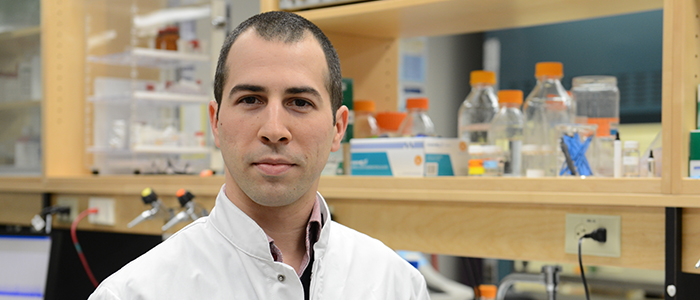High hopes for a future in neurological research

Recent debate about whether or not marijuana should become legalized in Canada makes Michael Loureiro's research on cannabinoid compounds and the brain very timely.
While it isn’t the reason Loureiro, PhD, became interested in working on research in this emerging field, the postdoctoral fellow had definitely given it thought.
“I’ve always been interested in understanding normal and pathological behaviours, which is why I took psychology courses,” Loureiro, said. “After that, I wanted to understand the neurobiological mechanism underlying these normal and pathological behaviours, so I completed a master’s degree and PhD in neuroscience.”
Loureiro is part of the Department of Anatomy and Cell Biology, as well as the Addiction Research Group at Schulich Medicine & Dentistry, which is led by Steven Laviolette, PhD. One of the Group’s main objectives is to better understand which brain circuits and molecules underlie the effects of cannabinoid compounds, such as marijuana, on emotional and cognitive processes.
In 2014, Loureiro published a study in Neuropsychopharmacology, a part of Nature Publishing Group, entitled “Hippocampal cannabinoid transmission modulates neuron activity: Impact on rewarding memory formation and social interaction”.
He investigated the involvement of cannabinoid receptors within a particular brain region called the hippocampus and how activation of these receptors can impact memory formation and social interactions.
His results showed that activating cannabinoid receptors directly within the hippocampus potentiated rewarding memory formation and altered sociability and social recognition in animal models.
“The use of cannabis as a treatment is very promising for many diseases, such as cerebral trauma and drug-resistant epilepsy,” Loureiro explained. More research needs to be completed to fully understand the consequences of medicinal marijuana in order to provide the safest compounds to patients suffering in their every day lives.
When it comes to legalizing marijuana for recreational purposes, Loureiro thinks it could be accomplished but the process would need to involve several precautions.
He argued that the percentage of tetrahydrocannabinol (THC) — the chemical responsible for most of marijuana's psychological effects — in the substance sold would need to be included in the label. He also thinks a prevention strategy specifically addressed to drivers and those under the age limit would need to be put in place.
Loureiro wishes for constant and never-ending self-improvement, and enjoys moving quickly. The father of two completed his PhD in three years, and authored/co-authored seven papers during that time. He has also already signed off on three papers during his time at Schulich Medicine & Dentistry, and has more on the way.
“My friends say that I am perseverant, but in my opinion I just like doing neuroscience research,” he said with a laugh. “I think that it is important to have a good career strategy or a plan in place, and to also observe our colleagues and learn from their choices and examples.”
Loureiro was one of the 2014 London Health Research Day platform presentation winners, and will also be presenting at this year’s event. The experienced presenter admits to getting nervous about speaking English in front of large crowds, but he works on preparation techniques that lead him to think about who the audience is, what their potential expectations could be, and what he can make them do to care about his work.
“I would advise other presenters to think outside the box and to think about the audiences’ expectations and to entertain them as much as they can,” he said. “Enjoy the opportunity to share the work you do in the lab.”








